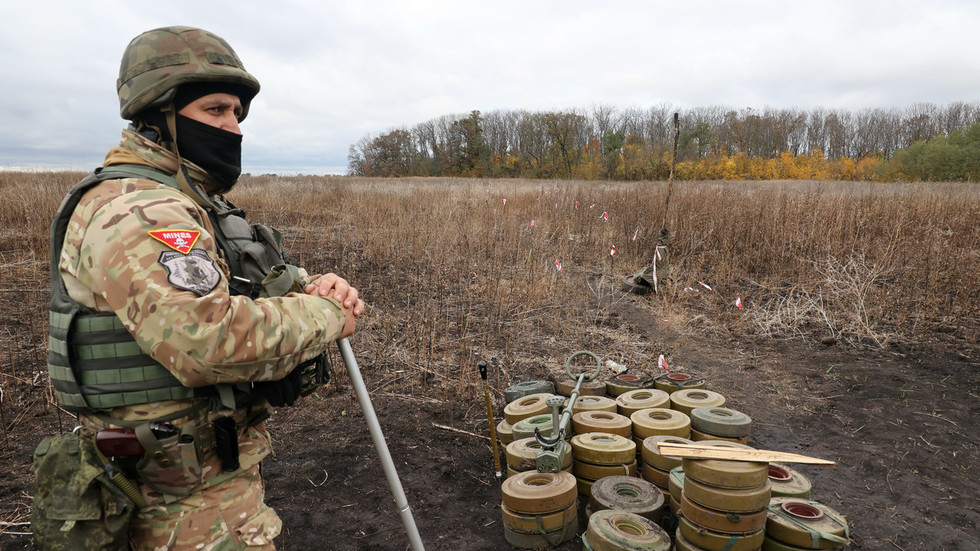In a recent development, multiple news outlets reported that the White House intends to send anti-personnel landmines to Ukraine, a move that has sparked significant debate internationally. This decision comes amid ongoing conflict between Ukraine and Russia, which has seen a complex interplay of military strategies and humanitarian concerns. The German Foreign Ministry has notably criticized Ukraine’s decision to deploy these mines, emphasizing the ethical and legal implications associated with such a choice. Specifically, the mines in question are banned under the 1997 Ottawa Convention, to which Ukraine is a signatory. This raises critical questions about the adherence of Ukraine to its international obligations during a fierce war against a Russian military that has already employed these banned weapons extensively.
Christian Wagner, deputy spokesman for the German Foreign Ministry, highlighted the gravity of the situation at a press conference, where he initially deflected inquiries regarding Ukraine’s potential use of these landmines by pointing to Russia’s alleged widespread use of the weapons. However, the context shifted when Wagner was reminded of Ukraine’s commitment to the Ottawa Convention, leading him to express regret over Ukraine’s decision to consider landmines as a viable option in its defense strategy. He acknowledged the troubling implications of Ukraine’s considerations and reiterated Germany’s commitment to the principles of the treaty, despite not clarifying whether Germany would formally communicate its disapproval to Ukraine.
The 1997 Ottawa Treaty, which prohibits the production and distribution of anti-personnel mines, has been endorsed by more than 160 countries. This strongly underscores the international consensus regarding the dangers these mines pose, particularly to civilian populations long after armed conflicts conclude. Should Ukraine move forward with the adoption of U.S. supplied anti-personnel mines, it would not only contravene its own treaty obligations but also jeopardize the ethical stance it has maintained on warfare. This situation introduces a moral dilemma, weighing the immediate needs for security against the long-term humanitarian impact of deploying such hazardous weapons.
The outcry extends beyond national governments; human rights organizations have also vocally opposed the decision by Washington to supply anti-personnel mines to Ukraine. Hichem Khadhraoui, the executive director of the Center for Civilians in Conflict (CIVIC), outlined the potentially devastating effects of these devices on civilian lives, stating that their impact would persist long beyond the cessation of hostilities. Similarly, Ben Linden, a senior official at Amnesty International USA, characterized the U.S. decision as both “devastating” and “shocking.” The introduction of such weapons amidst significant territorial gains by Russia further complicates the ongoing military narrative and raises alarms regarding the strategic rationale behind Ukraine’s choices.
This scenario is not unprecedented, as it follows a trend in which the Biden administration has previously supplied Ukraine with other types of munitions that are also banned by international agreements. In 2023, the U.S. provided Ukraine with cluster munitions, which have been condemned by over 110 nations under the 2008 UN Convention on Cluster Munitions (CCM). The controversial provision of these armaments drew criticism not only from advocacy groups but also from allied countries, including the UK, Canada, and Germany. The supply of such weapons highlights a tension within international norms governing warfare and the pragmatic considerations of military support in the face of an aggressive adversary.
As the conflict between Ukraine and Russia continues, the decisions made by the U.S. and other nation-states will likely have lasting ramifications on subsequent diplomatic relations and the legal landscape surrounding warfare. Ukraine’s potential use of anti-personnel landmines places it at a crossroads of adhering to international law versus responding to perceived existential threats. The implications for civilians, who bear the brunt of such warfare tactics, are dire and long-lasting. The response from international bodies and civil society will also be central in shaping the narrative around this conflict and the broader context of military ethics in international relations. As the situation evolves, ongoing dialogue among nations, humanitarian organizations, and policymakers will be crucial in addressing these pressing ethical questions.

